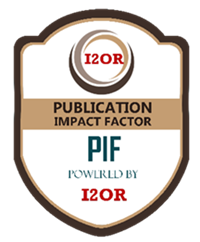VERIFICATION OF SEVERAL IMPORTANT THEOREMS IN SIMPLE RANDOM SAMPLING USING R SOFTWARE
DOI:
https://doi.org/10.53555/nnms.v8i12.1134Keywords:
simple random sampling, sample mean, sample variance, sample covariance, mathematical expectationAbstract
This paper considers the verification of several important theorems in simple random sampling using R software. First several important theorems in simple random sampling are introduced systematically. Then computer program for the verification of these theorems is written using R. According to these R codes, the paper verifies these theorems. The output proves that the R codes are very practical and effective.
References
H. O. Hartley, A. Ross, Unbiased ratio estimators, Nature 174 (4423) (1954) 270{271.
H. A. David, H. Hartley, E. S. Pearson, The distribution of the ratio, in a single normal sample, of range to standard deviation, Biometrika 41 (3/4) (1954) 482{493.
X. Meng, Scalable simple random sampling and stratified sampling, in: International Conference on Machine Learning, PMLR, 2013, pp. 531{539.
C. Kadilar, H. Cingi, Ratio estimators in simple random sampling, Applied mathematics and computation 151 (3) (2004) 893{902.
S. Gupta, J. Shabbir, On improvement in estimating the population mean in simple random sampling, Journal of Applied Statistics 35 (5) (2008) 559{566.
C. Kadilar, H. Cingi, Improvement in estimating the population mean in simple random sampling, Applied Mathematics Letters 19 (1) (2006) 75{79.
L. Goldstein, G. Reinert, Stein’s method and the zero bias transformation with application to simple random sampling, The Annals of Applied Probability 7 (4) (1997) 935{952.
S. Singh, Simple random sampling, in: Advanced Sampling Theory with Applications, Springer, 2003, pp. 71{136.
P. West, Simple random sampling of individual items in the absence of a sampling frame that lists the individuals, New Zealand Journal of Forestry Science 46 (1) (2016) 1{7.
C. Kadilar, H. Cingi, Improvement in variance estimation in simple random sampling, Communications in Statistics)Theory and Methods 36 (11) (2007) 2075{2081.
P. Pathak, On simple random sampling with replacement, Sankhy¯a: The Indian Journal of Statistics, Series A (1962) 287{302.
S. Mitra, P. Pathak, The nature of simple random sampling, The Annals of Statistics (1984) 1536{1542.
S. Gupta, J. Shabbir, Variance estimation in simple random sampling using auxiliary information, Hacettepe Journal of mathematics and Statistics 37 (1) (2008) 57{67.
H. P. Singh, R. S. Solanki, A new procedure for variance estimation in simple random sampling using auxiliary information, Statistical papers 54 (2) (2013) 479{497.
W. G. Cumberland, R. Royall, Does simple random sampling provide adequate balance?, Journal of the Royal Statistical Society: Series B (Methodological) 50 (1) (1988) 118{124.
Published
Issue
Section
License
Copyright (c) 2021 Journal of Advance Research in Mathematics And Statistics (ISSN: 2208-2409)

This work is licensed under a Creative Commons Attribution-NonCommercial-NoDerivatives 4.0 International License.
You are free to:
- Share — copy and redistribute the material in any medium or format for any purpose, even commercially.
- Adapt — remix, transform, and build upon the material for any purpose, even commercially.
- The licensor cannot revoke these freedoms as long as you follow the license terms.
Under the following terms:
- Attribution — You must give appropriate credit , provide a link to the license, and indicate if changes were made . You may do so in any reasonable manner, but not in any way that suggests the licensor endorses you or your use.
- No additional restrictions — You may not apply legal terms or technological measures that legally restrict others from doing anything the license permits.
Notices:
You do not have to comply with the license for elements of the material in the public domain or where your use is permitted by an applicable exception or limitation .
No warranties are given. The license may not give you all of the permissions necessary for your intended use. For example, other rights such as publicity, privacy, or moral rights may limit how you use the material.




